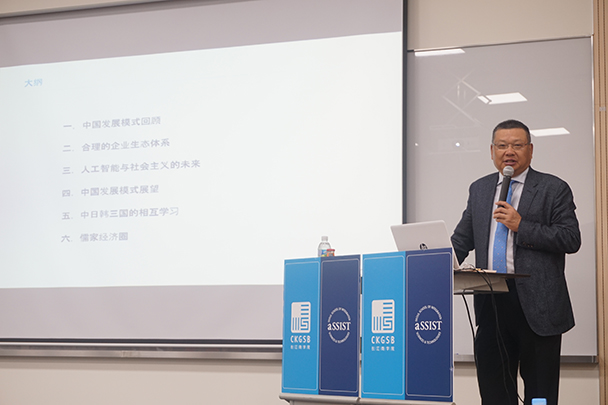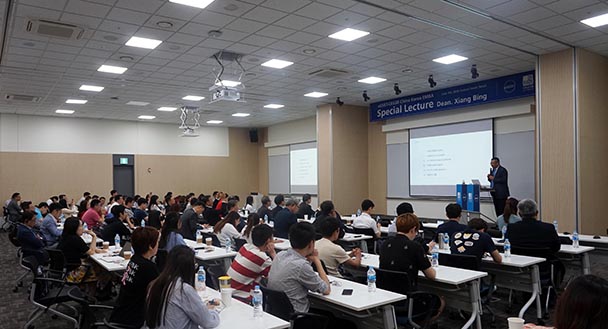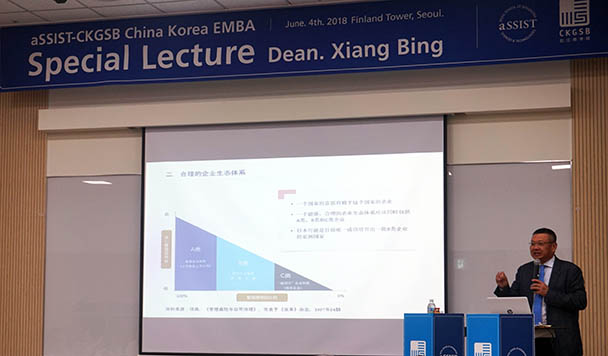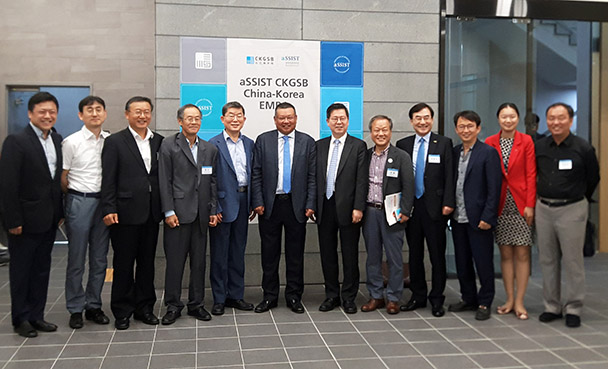
On June 4, more than 70 people consisting of scholars, corporate executives, and students gathered in a classroom prepared by aSSIST (a Seoul School of Integrated Sciences & Technologies) – they had been awaiting for a special seminar by the dean of Cheung Kong Graduate School of Business (CKGSB), a rare opportunity in Korea to gain insights from a dean of one of the most prominent global MBA schools. Throughout the lecture co-hosted by CKGSB and aSSIST, attendees listened with rapt attention to Founding Dean Xiang Bing’s insights on Chinese economy and Chinese firms.
Under the agenda ‘Chinese Transformation after 19th National Congress of the Communist Party of China’, Dean Xiang Bing elaborated overall stance and prospects on Chinese economy via six topics: Chinese economic model in developing era, reasonable ecosystems for corporates, AI’s effect on socialism, prospects on new Chinese developing model, the importance of benchmarking among three East Asian countries, and Confucian Economic Sphere.

Neoliberalism and state capitalism
Dean Xiang Bing stressed that the combined economic model of neoliberalism and state capitalism brought China’s economic development for the last forty years. Compared to Western countries, Chinese economy still shows potential for further growth under the neoliberalism system, as there are regulations yet to be alleviated. He also mentioned that China should learn from Europe’s “social democracy” and build its own growth model combining neoliberalism, neo-nationalism, and capitalism.

Reasonable ecosystems for corporates
When Dean Xiang Bing explained “reasonable ecosystems for corporates”, the concept of dividing corporates into three groups caught everyone’s attention. He divided global corporations into three major groups: “A” for the family-owned company, “B” for the modernized company, and “C” as the state-owned company. Although Huawei was mentioned as an exemplary B company among Chinese firms, China’s present weakness is the lack of B-group companies.

Benchmarking among three East Asian countries
Moreover, Dean Xiang Bing shared his insights regarding strengths and weaknesses of three East Asian countries – Korea, China and Japan – and emphasized the importance of benchmarking among these nations. Korea had showed rapid development derived from conglomerates, which became the driving force in the national development. Although it had side-effects, it is obvious that the competency of conglomerates had contributed greatly in cultivating global competency.
Dean Xiang Bing remarked, “China has a lot to refer from successful cases in Korea. Korea created outstanding IT firms by successful transformation from labor-intensive industry to high-tech and service industries.”
In case of China, the nation had shown the three powers of transformation during the last thirty years – neoliberalism, new globalization, and information democratization. China’s power lies in its openness towards new concepts and technologies; most of all, the nation creates a new nationwide competency every ten years, pushing back its past behind.

Confucian Economic Sphere
For a long time, Dean Xiang Bing has been highlighting the importance of Confucian Economic Sphere, the economic block sharing Confucian cultures such as China, Korea, Japan, Singapore, Macao, and Vietnam. GDP of Confucian Economic Sphere is showing a high portion of contribution in the global economy, reaching USD 19 trillion in 2017 – moreover, it boasts a rapid growth rate. He emphasized on the cooperation among Confucian culture countries, which can be achieved by countries sharing their cases of success and failure.
“In the past, Asian countries had to benchmark Western countries because they were unable to generate creative concepts,” the dean illustrated, “however, such era must come to an end – and I sincerely believe that the rise of Confucian Economic Sphere will lead to providing many solutions that will solve global issues.”
Even after the seminar had ended, all attendees remained seated for the following Q&A session, continuing questions and answers on Chinese economy and international politics. The special lecture on June 4 was conducted by CKGSB and aSSIST, the school which co-hosted ‘CKGSB EMBA on China Business: A program for Korean Leaders (CKGSB Korean EMBA)’ in 2015. The program was designed for Korean CEOs and founders who wished to gain in-depth knowledge of Chinese market. Leaders from diverse industries participated in the first program, and the session completed successfully in November 2017. The second program will be launched in coming October.
To read the Korean blog version of this content, please click here